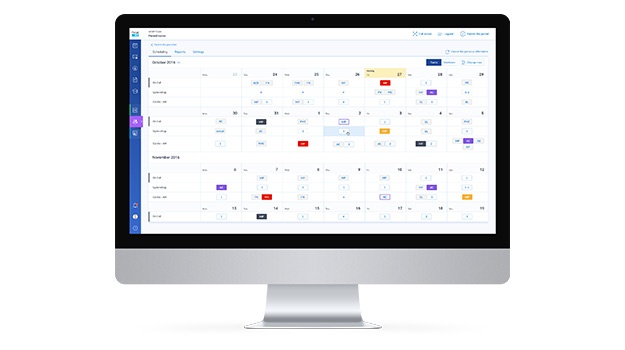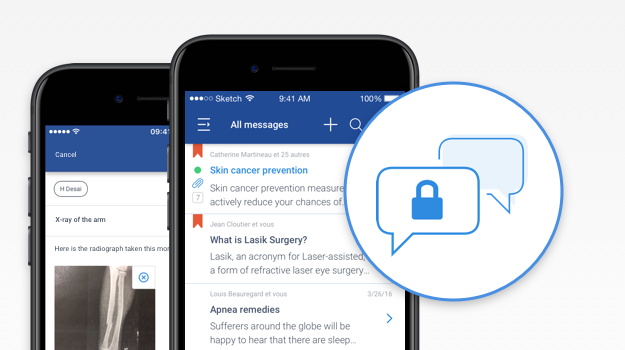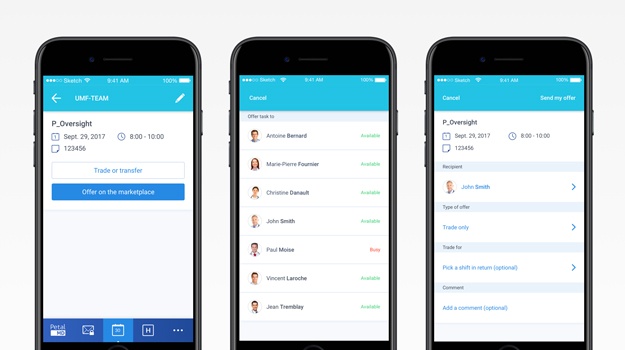
Physicians working in hospitals face unique challenges when creating, managing and disseminating their schedules. They must take into account a large number of factors: absences, subspecialties, fairness, operating rooms, on-call coverage, contracts, personal preferences, etc.
Here are 10 reasons why tens of thousands of Canadian physicians have chosen Petal Scheduling to solve these challenges.
1. Less time spent creating schedules
Petal Scheduling greatly accelerates shift planning in two ways: by making it easier to compile non-availabilities (vacations, conferences, absences, sickness, etc.) and by automating schedule creation.
Members can submit and edit their non-availabilities from any device, while schedulers have access to all of those non-availabilities in real time. They can then input the rules for their group into Petal Scheduling. In just a few minutes, the algorithm offers an optimal schedule that can be adjusted manually as needed.
Dr. Friesen saves 100 hours/year thanks to Petal Scheduling
After trying and being disappointed by an American planning solution, Dr. Friesen of the Peterborough Regional Health Centre tried Petal Scheduling and immediately adopted it. Creating a three-month schedule used to require 40 hours of work, but it takes him only 15 hours now. This represents a total of 100 hours saved each year.
2. Improves physicians’ quality of life
Ensuring that each physician in the department has balance between their personal and professional lives can become a real headache when you take into account the diversity of requirements put forward by everyone.
Petal Scheduling ensures that all requests sent to schedulers are respected as much as possible by treating each physician’s preferences and constraints as a mathematical equation to be solved. When some requests are incompatible, the solution highlights the conflict, and schedulers can adjust the schedule manually. They can also automatically give priority to certain rules based on what matters most to the members of their department.
3. Fair shift distribution
Some tasks or shifts are more coveted than others, which can quickly complicate schedule management. For example, few physicians want to work on weekends or be assigned drastically more on-call tasks. How can you make sure that these shifts are distributed fairly within the group according to the profile of each physician and the weight of each of their tasks?
Petal Scheduling’s rules can be configured to ensure certain tasks are distributed fairly based on the amount of work they represent and the availability of each physician. The system constantly monitors fairness using a per-task counter and can produce fairness reports for a given period of time. For example, at the end of the year, schedulers can produce a summary of how many Friday evenings were assigned to each physician. Such a report would allow them to adjust the distribution of Friday evening shifts in the next period.
Examples of rules for automatically granting physician requests
- No more than 13 shifts per month for Dr. A
- No more than three consecutive workdays for Dr. B
- Dr. A must always work at the same time as Dr. B
- No member can work two weekends in a row
- Each member must work at least one weekend per month
- Dr. C can’t work at the same time as Dr. D
- No shift on Mondays or Fridays for Dr. E
4. Synchronization with external calendars
For many physicians, time management is a complex challenge: training activities, research, clinic hours, conferences, personal events, etc. Using a solution to facilitate this management can easily become a waste of time if it involves adding a new calendar to the tools already in use.
Petal Scheduling takes this reality into account by offering full synchronization with external calendars such as Google Calendar or Outlook. That way, physicians can access their work schedule on their smartphone or tablet at any time. They can also share their availability with people of their choosing, such as their secretary or some of their family members.
5. Reduces communication errors
The proper functioning of a hospital department depends largely on how well its various stakeholders communicate, whether they are physicians, secretaries, schedulers or hospital administrative staff. When several versions of a schedule are circulating at the same time, the risk of error skyrockets.
Petal Scheduling is cloud-hosted and offers a single version of the schedule that is always up-to-date. Members can access their personal and group schedules from any device using the iOS and Android apps. Schedule changes made by the scheduler or group members are applied in real time, and notifications can be sent to those concerned.
6. Complies with contracts and commitments
Hospital departments must honour their commitments to the hospital no matter the schedule changes that occur. For example, in the case of a radiology department, hospital management may require daily on-call coverage, a certain number of cardiothoracic scans to be performed each year and a minimum amount of research to be done per month. The same can apply to individual physicians’ contracts.
Once such commitments are input into PetalScheduling, the algorithm ensures that they are respected at all times. When a shift change request is incompatible with established commitments—for example, because two physicians with the same expertise plan to be absent at the same time—the solution automatically highlights the conflict, and the scheduler can adjust the schedule.
7. Protects exchanges and patient data
Physicians who share patient data using unencrypted emails, text messaging or cloud providers such as Google and Yahoo are unwittingly exposing themselves to fines. One unintentional data leak is all it takes for the authorities to punish a doctor for violating the PIPEDA safety standard. The hospital where the physician works could also be penalized.
The Petal Scheduling solution ensures the confidentiality of exchanges between physicians using a secure messaging feature that transmits information and pictures from an encrypted database.
Examples of lawsuits and fines due to medical data leaks
- $1.44 million – Walgreen (US)
- $2 million – Trilium Health Hospital (Canada)
- $4 million – Stanford Hospital & Clinics (US)
- $4.8 million – NewYork-Presbyterian Hospital (US)
- $412 million – Rouge Valley Health System (Canada)
8. Mobile access to personal and group schedules
It’s easier to access an online schedule than a paper one. However, if you truly want physicians to have quick access to their schedules from anywhere, online availability is not enough: the interface must also be perfectly adapted to mobile devices.
Petal Scheduling’s iOS and Android mobile apps were designed using the latest in user experience best practices. In addition, the PetalMD team is always listening to physician feedback when improving its interfaces, which means the app is constantly being improved and always tailored to its users’ everyday reality. Whether viewed on a computer, smartphone or tablet, the schedule is always optimally displayed and automatically updated.
9. Simplified shift swaps
When two radiologists want to swap shifts without using an online solution, they inevitably have to go through their scheduler, who must first make sure that the swap is possible and then manually communicate the schedule changes to all the staff involved.
Petal Scheduling offers radiologists the ability to perform task transfers within the application itself. Users—whether they are physicians or secretaries with access rights—can even offer shifts to the entire group. A physician who is interested in the offer can accept it from any device: the schedule will automatically update, and a notification will be sent to all concerned. The scheduler is free to choose whether or not they must approve changes made by members before they are applied. Either way, they can view all changes and their authors.
10. Easy transition when the scheduler changes
How can you ensure knowledge is transferred properly when a physician who has been creating and managing the schedule for several years passes on the torch to another physician? Conversely, how can you avoid repeating the process of learning the rules that govern the hospital department when the person in charge of scheduling is constantly changing?
With Petal Scheduling, the rules and procedures of the physician group are saved, centralized and do not depend on one person’s knowledge. The solution produces templates that considerably speed up the creation of future schedules. By ensuring that the rules governing the optimal management and distribution of their tasks are safely maintained, physicians increase the likelihood that their requests, preferences and agreements will be honoured when the scheduler changes. As for future schedulers, their work will be both easier and faster.




